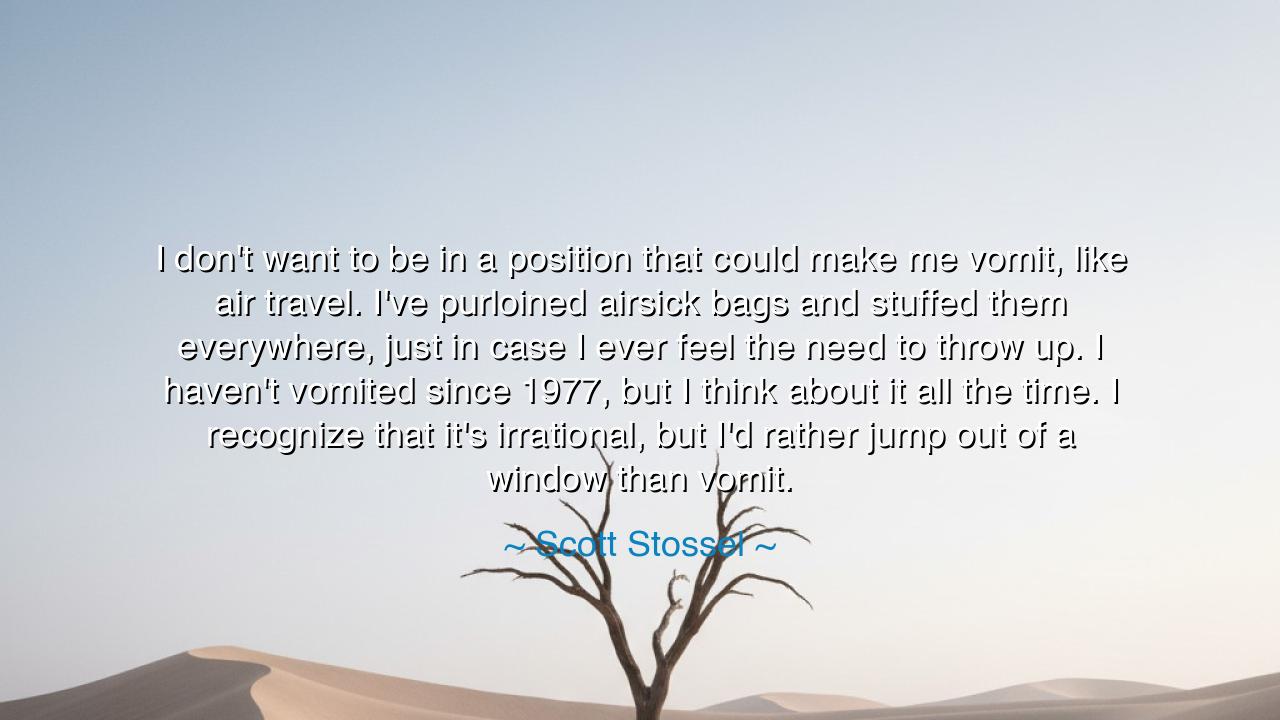
I don't want to be in a position that could make me vomit, like
I don't want to be in a position that could make me vomit, like air travel. I've purloined airsick bags and stuffed them everywhere, just in case I ever feel the need to throw up. I haven't vomited since 1977, but I think about it all the time. I recognize that it's irrational, but I'd rather jump out of a window than vomit.






When Scott Stossel confessed, “I don’t want to be in a position that could make me vomit, like air travel. I’ve purloined airsick bags and stuffed them everywhere, just in case I ever feel the need to throw up. I haven’t vomited since 1977, but I think about it all the time. I recognize that it’s irrational, but I’d rather jump out of a window than vomit,” he gave voice to a struggle as ancient as the human heart: the battle between fear and reason. Though his words seem humble and even strange, they echo the timeless truth that the mind may imprison us in chains stronger than iron, yet also hold the keys to its own liberation.
This quote is not merely about vomiting or airsick bags; it is about the power of phobia, that unseen adversary which can haunt even the strongest spirit. Stossel speaks of an irrational dread, but within his confession lies a universal condition: every person carries some private terror, a specter they dread above pain or humiliation. His fear is visceral and specific, yet its lesson is universal—what we fear most may not even touch us, yet we may build our lives around it, fortifying ourselves against a threat that may never come.
The ancients knew this paradox well. Consider Hannibal, the great Carthaginian general who crossed the Alps with his elephants to strike Rome. Despite his unmatched courage on the battlefield, it was said he feared nothing so much as failure and dishonor. That fear drove him to brilliance but also to relentless, restless campaigning, even when victory was nearly impossible. Just as Hannibal’s fear shaped his destiny, so Stossel’s dread shapes his habits—airsick bags hidden everywhere, a life organized not around actual sickness but the possibility of it. Fear becomes a compass, though it points not to freedom but to avoidance.
And yet, in this confession, there is also a kind of heroism. Stossel admits the irrationality of his phobia; he sees clearly the absurdity of being more willing to leap from a window than to vomit. This self-awareness is not weakness but strength. To name one’s fear is the first act of courage, to shine the light of words upon what crouches in the shadows. In this way, Stossel stands as an unwitting teacher: even when our fears seem petty or strange, voicing them grants them less power.
The deeper meaning of the quote lies in its contrast: decades have passed since Stossel last experienced what he dreads, yet he still prepares for it daily. This reveals the central truth of anxiety—that it is not the event itself that enslaves us, but our anticipation of it. As the Stoic philosopher Seneca wrote, “We suffer more in imagination than in reality.” Stossel suffers not from vomiting but from thinking about vomiting. His battle is not with the body but with the mind, and so is ours.
Thus, dear listener, the lesson is clear: identify the irrational fears that govern your steps. Are you, too, arranging your life to avoid an unlikely terror? Have you stuffed “airsick bags” of your own—habits, excuses, escape routes—in every corner of your days? The first step toward freedom is not to despise yourself for fear but to see it clearly, to speak its name, and to gently test its strength.
In practical terms, this means practicing small exposures to what frightens you. Just as warriors once trained by sparring with wooden swords before wielding steel, so too can you face fear in increments. If your dread is social rejection, speak to a stranger. If your phobia is flight, stand at an airport. If your terror is failure, take a small risk. Each step weakens the hold of anticipation and strengthens your courage.
And so the words of Scott Stossel, though spoken of vomit, are truly about freedom. They teach us that the most powerful prisons are built not of stone but of thought, and the bravest act is not to run from the specter but to confront it. May you, hearing this, look upon your own fears and find the resolve to move through them, until the imagined suffering dissolves and your life is no longer ruled by shadows but by choice.






AAdministratorAdministrator
Welcome, honored guests. Please leave a comment, we will respond soon